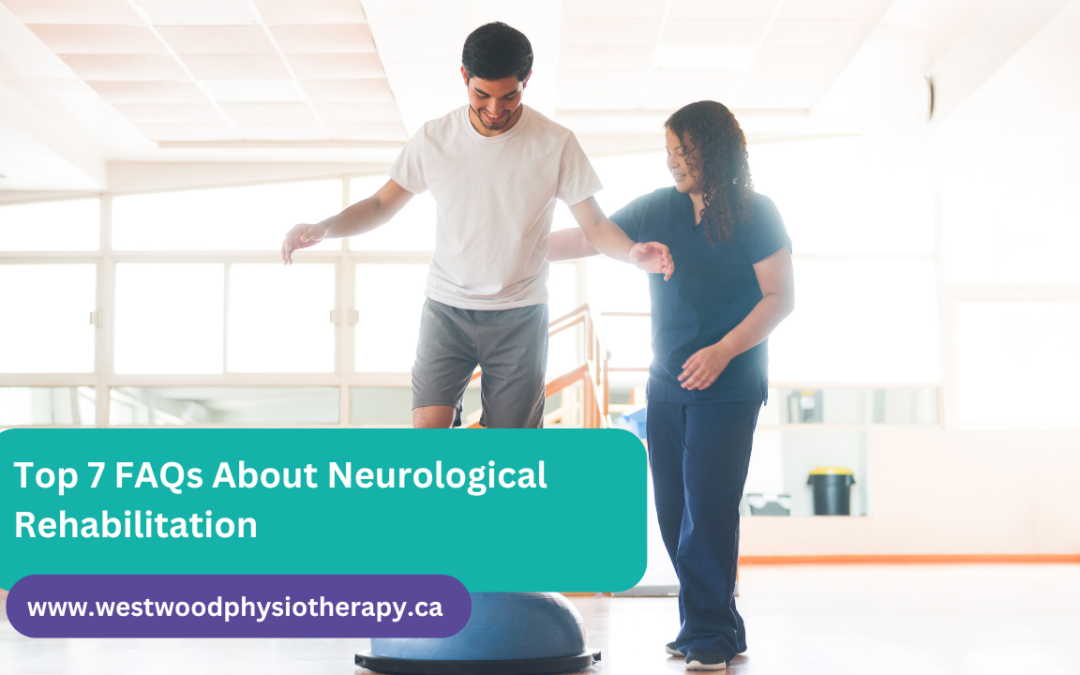Navigating neurological rehabilitation can feel overwhelming, especially with many questions on what to expect. It involves a range of therapies to help you regain or improve skills after a brain injury, stroke, or other neurological issues. By addressing the most common questions, you can better understand the journey ahead and set realistic expectations.
Rehabilitation is an essential part of recovery, focusing on building strength, movement, and independence. Whether it involves physical therapy, occupational therapy, or speech therapy, each plays a critical role in helping you return to everyday activities.
Understanding the timeline and progress can provide some clarity. Recovery varies based on the individual, the condition’s severity, and the specific therapies involved. Your patience and active participation make a significant difference in achieving your rehabilitation goals.
Have questions about neurological rehabilitation? At Westwood Physiotherapy Clinic in Guelph and Tavistock, our expert team is here to help you regain mobility, improve function, and enhance your quality of life. Book your appointment today and take the first step toward better recovery!
1. What is neurological rehabilitation?
Neurological rehabilitation is a specialized form of therapy aimed at helping individuals recover from neurological disorders or injuries that affect the brain, spinal cord, and nervous system.
This type of rehabilitation is designed to improve function, enhance quality of life, and promote independence for those who have experienced conditions such as stroke, traumatic brain injury, spinal cord injury, multiple sclerosis, Parkinson’s disease, and other neurological conditions.
The goal of neurological rehabilitation is to help patients regain as much function as possible, adapt to any lasting changes, and improve their overall well-being.
Through a combination of therapeutic interventions, education, and support, individuals can work towards achieving their personal goals and enhancing their quality of life.
2. What’s the Difference Between Neurological Physiotherapy and Regular Physiotherapy?
Neurological physiotherapy is a specialized field that focuses on treating patients with neurological conditions. These are disorders that affect the brain, spinal cord, and nerves.
Key Differences:
- Conditions Treated:
- Neurological physiotherapy addresses strokes, multiple sclerosis, Parkinson’s disease, spinal cord injuries, and more.
- Regular physiotherapy often deals with musculoskeletal injuries like sprains, fractures, and post-surgery recovery.
- Techniques Used:
- You’ll encounter specialized techniques such as constraint-induced movement therapy and neurodevelopmental therapy.
- Standard physiotherapy might use massage, joint mobilization, and exercise programs.
- Goals:
- Focus is on improving motor control, balance, and coordination for those with nerve damage.
- Regular physiotherapy aims at pain reduction, strengthening muscles, and flexibility.
3. What Conditions Can Neurological Rehabilitation Help Treat?
- Stroke: Therapy often focuses on improving mobility, speech, and daily activities.
- Brain Injuries: Treatment can help regain cognitive and physical skills impacted by the injury.
- Multiple Sclerosis: Rehab may help manage symptoms like mobility issues and fatigue.
- Parkinson’s Disease: Exercises and therapy can assist with movement, balance, and tremors.
- Spinal Cord Injuries: Support may include learning new ways to move and strengthen muscles.
- Neuropathy: Rehab can improve sensation and coordination, helping you manage pain.
Neurological rehabilitation uses different approaches and therapies to target each condition’s specific needs. You might work with specialists like physical therapists, occupational therapists, or speech-language pathologists.
4. What are the common symptoms of neurological disorders?
Neurological rehabilitation can be crucial for recovery after certain health issues. Ask yourself if you or a loved one are facing any of these key signs or symptoms.
- Difficulty moving or walking: Trouble with balance, muscle weakness, or coordination can point to a need for therapy.
- Problems with speech or swallowing: If you notice slurred speech or trouble swallowing, it may be time to consider rehabilitation.
- Memory or concentration problems are another red flag. Forgetfulness, confusion, or trouble focusing on tasks can indicate that neurological help is needed.
- Look for changes in behavior or mood. Sudden mood swings, agitation, or withdrawal from social interactions can signal underlying neurological issues.
- Chronic pain or unexplained sensations like tingling or numbness are also concerning. These symptoms often require professional evaluation and care.
- Seizures or episodes of losing consciousness mean you should seek immediate help. These can be serious and a sign of deeper problems.
If you’ve observed any of these symptoms, consult a healthcare professional. They can guide you on whether neurological rehabilitation is needed and plan the right course of action.
5. What types of treatments are included in a neurological rehabilitation program?
Neurological rehabilitation programs include many different treatments.
- Gait training helps you improve how you walk. You may use equipment to help you practice moving smoothly and safely.
- Balance exercises focus on stability. These exercises can prevent falls and help you feel more secure when moving.
- Strength training uses weights or resistance to build your muscles. Stronger muscles support your daily activities.
- Coordination drills help you control your movements better. These exercises can include tasks like catching a ball or threading a needle.
- Electrical stimulation uses small electrical pulses. These help muscles work better and can assist in reducing pain.
- Cognitive therapy focuses on your thinking skills. It helps improve memory, problem-solving, and attention.
Each treatment is chosen to match your specific needs. A team of experts will work with you to provide the best care possible.
6. How long does neurological rehabilitation take?
The length of neurological rehabilitation varies greatly. It often depends on the specific condition you’re dealing with.
For mild brain injuries, therapy might last a few weeks to a couple of months. During this time, you’ll likely attend sessions several times a week.
For more severe neurological conditions like a stroke, the process can take months or even years. Improvement might be slow and steady.
Your unique response to rehabilitation plays a big role in the timeline. Some people progress quickly, while others may take longer to see changes.
Age, overall health, and commitment to exercises are also factors. These can either speed up or slow down your recovery.
If you’re wondering about your specific situation, always consult your healthcare provider for more detailed guidance.

7. What can I expect during my first neurological rehabilitation session?
During your first neurological rehabilitation session, you will typically begin with an initial assessment. This involves a therapist asking questions about your medical history, current symptoms, and any concerns you might have. They may also conduct some physical tests to assess your movement and strength.
Following the assessment, the therapist will work with you to set specific goals for your rehabilitation. These goals are tailored to your unique needs and are aimed at improving your daily life. You might discuss what you hope to achieve, such as increased mobility or better hand function.
A typical session might include exercises to improve strength and coordination. These could involve balance activities, walking exercises, or stretching routines. Your therapist will guide you through each step and may use tools or equipment to support your progress.
You may also work on cognitive tasks if needed. This could involve memory games or problem-solving activities. Therapists sometimes introduce adaptive techniques to help you manage daily tasks more easily.
Remember: It is important to communicate openly with your therapist. Let them know how you are feeling during exercises, and share any concerns or questions you have. Your feedback helps to adjust the therapy plan to better suit your needs.
Conclusion
Neurological rehabilitation plays a vital role in improving the quality of life for those with neurological conditions. It helps you regain strength, movement, and cognitive function.
At Westwood Physiotherapy in Guelph, ON, our experienced team is ready to support your journey. We offer personalized programs tailored to your needs.
If you or a loved one is seeking expert care, consider visiting us. Our commitment is to provide the best possible care for neurological rehabilitation.
Your health is important. Let us help you take the next step towards recovery. Visit us for more information and to start your journey today.


